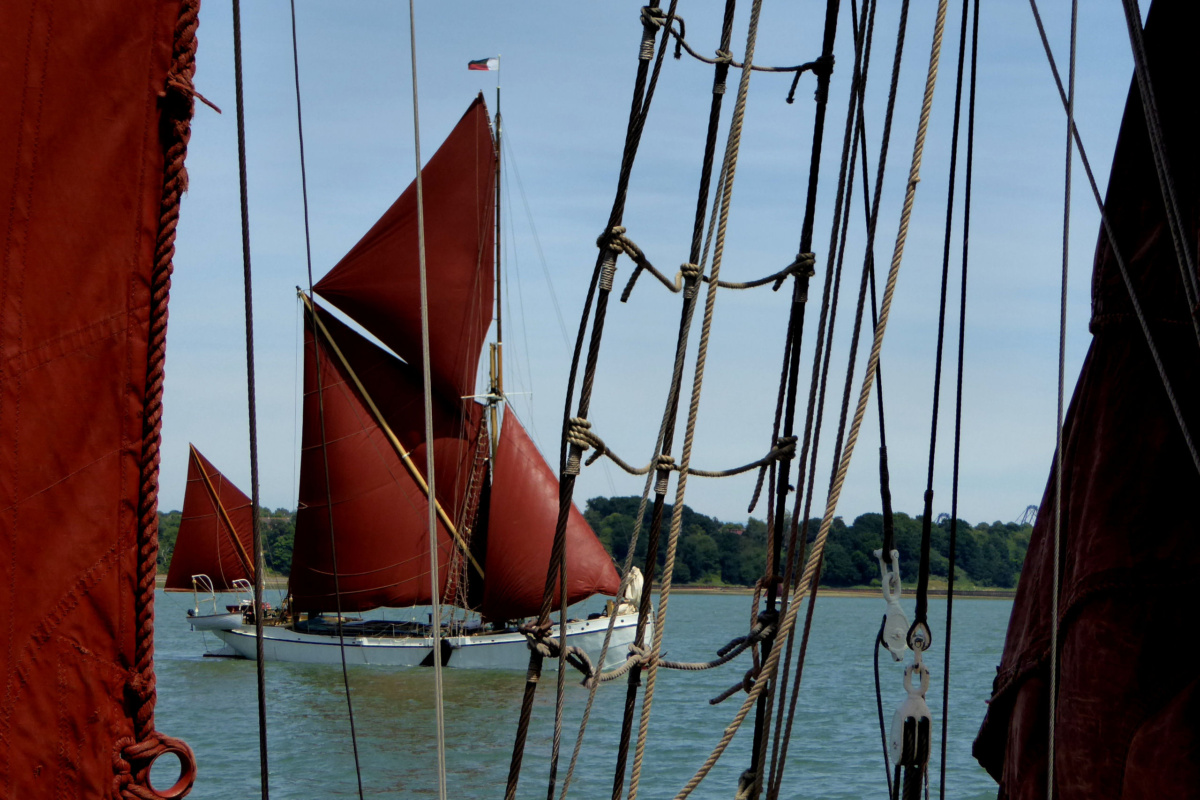[8.5 mins reading time]
Just one more, Jack thinks.
Just the one last trip under sail.
They’re waiting, the skipper and his mate. These last coasting bargemen, waiting for the agent’s call.
Beneath a summer sky, Jack shivers.
He’s seen the dark advance. It seems the days of sail will shortly cease. And there’ll be one more abandoned barge. A skeleton of timber ribs by banks of sea lavender.
Each corpse will rot, and by the salty tide they’ll then be stranded on the beach.
Oh how he wishes, they still could race the sea roads.
Captain Jack begins as a barge boy. He’s lived his life below the sail. Schooled by tidal river, he has a rolling pace on land and the long eyes of a waterman. His final ship’s the Cambria, built at a shipyard on the marsh. It draws one single salty fathom, it has five thousand red square feet of sail.
By mizzen main and topsail, by shroud and topping lift. By flying jib and job, you could never beat a bargeman in a tideway.
Not long before, in the years of war, a thousand barges hummed up and down the London River. The shores were barbed with wire, booms set at sea. A skipper and his mate might set sail with half a loaf between them. No lights at sea, they sailed by memory alone.
A true sailorman never hurries, he lets the vessel do the heft.
Standing tall at transom stern, the wind-burned captain cradles his pipe, looks to moonway under stars. Three-score years on wood, a ceaseless search for wind. What quiet men are these, the crew of sighing barge.
By help of wind and spritsail rig, he and the mate will haul two hundred tonnes of coal, a load of wheat or block cement, linseed sacks or sugar. Many a working day, they’re wet to waists with sea.
Jack and Blondie Bill take the Cambria up the creek to Oare. Past the Ferry Inn, nestling under the green hillside. Where gull and lark look down upon the olive marsh.
Unpaid at Yantlet Creek, they wait by candlelight. Watch through fearsome winter, the saltings deep in frozen snow.
Yet spring days bring a visit from his daughter Thora. She’s married a naval man of middle rank. She takes Jack to a seaward cottage, close to trains from shore to city.
They collect the keys, walk beyond the tarred fish-sheds, open a door in peeling weatherboard. Bombs have broken every window, chairs are swathed against the mice. The basement’s been emptied, and at the top of tide they watch the water come inside.
Cries Thora, “It’s perfect, look at the views of the bay. The oyster beds.”
There are rolling waves, small boats jumping on their moorings. “Now the war’s over, we should be safe to start a family.”
Jack looks out and says, “I steered a powder barge past this very house, bombers flying above. We waited weeks, grew two feet of weed, had to poach ashore, cook rabbit stew with wild pears.”
“If I die too soon, I’d like you to lay my melodeon in the coffin, and bury me in solid soil.”
So he smiles, perhaps he now can find a way to help on land.
Jack says to Thora, “I’ll help with the house, make it watertight. There’s a bit to do.”
“You buy the house. Why not crew our final trip.”
So Skipper Jack and Bill are down at Poole with Thora. Loading up with golden barley. They edge across the Brownsea bar, a sea breeze blooms, two lee-deck seams soon are under water. They race the local boats, approach the tidal switch. And in Rye Bay they come about, for Norman fishers out from Caen are wanting news. They swing across with thanks a bucket full of scallops.
Now the ebb tide’s going north, they speed into the northern sea.
This sea is often not a sea, sandbanks climb on every tide. A careless barge can strand, shudder stem to stern. Broken-backed, wind screaming in the rigging. Crews have drowned on that rising underworld.
Jack has in his mind this map of every swatchway. Each gut and course, more like steering on a creek. They sail safely cross the Maplins, the depth at flood at just half a fathom. There are grey seals basking on the Barrow Sands.
They put ashore on the northern Dengie, by the ruined Saxon chapel of St Cedd. At a tarred cottage on the seawall, they call for old friend Walter. He’s the last wildfowler, a quiet man without a fear.
Jack swaps out a sack of barley, takes aboard two brace of duck. All four sit in the gloaming, Thora shares her naval cigarettes. The water now is calm, the moon above the sea.
Thora takes the wheel at dawn, pauses at the bar of River Ore. It’s a feisty reach, so at the flood at Shingle Street they dash upstream. They turn to port past Iken church, and moor at Snape.
It takes a day and a night to unload the barley for the mash. In the Plough and Sail, ale is sipped from wartime jam jars.
Next to Keadby on the Humber. To fetch the coal for town and city gasworks. They travel back to salt, to the good clean air of the eastern coast.
The sails spread tight, they coast northward. Past fishing hamlets that once were havens.
The sun sets over land, where are stabled shire horses and the morning’s whetted scythe. They skirt Grimsby, see trawler stacks in dock. Sail leagues inland to the railhead on the Trent.
Each coal truck tips ten tons, the trimmers scramble down below. At the jetty pub they eat, join the songs of mariners and railwaymen.
The heavy barge sails next day.
Anchored off the shore at Hull, they wait for the flood’s last hours while Jack and Thora row hard ashore for stores.
The wind backs west to south-west squally.
There are distant signs, darker weather causing frowns. Thora casts off, and sails southward. Ahead is a rainbow flash of troubled colour.
They see rising up a tall black thundercloud. Beneath’s a wall of angry water.
The three are shouting now. They reef the sails so fast. But brutal wind and rain slams into them.
And over goes the Cambria, her hatches under water.
Both Jack and Bill bend their bones. Thora at the wheel is pulling hard, they run before the wind. Another squall attacks.
Shouts Blondie Bill, “Blinking dark isn’t it.”
Their prospects, perhaps this post-war epoch too.
The barge staggers, rain drums on wood. And away she goes, racing now at nine knots. With her weighty haul of coal, they hurtle hard, chased by wretched wind to Holland.
The barge is surging, sending spume across the hatches. The three are sodden, they watch the coast advance.
Beyond the white caps, the beach grows sharper fast. In days gone by, wreckers might have gathered, awaiting spillage from a broken barge like this.
Now they’re close. Their limbs shaking, stiff with effort. They can see quite clearly blossoms on the dunes. Banks of blue sea holly, clumps of white seakale.
Alas.
For any waiting company. The wind blows out.
The clouds race by, sea and sky turn blue.
Jack and Bill and Thora are hooting. There are only gentle ripples on the swell, a north-west breeze commences.
They set the course again for London.
In the galley Bill fries sliced potato, this is now a cheery tale. A hundred extra leagues to sail, they might make the Surrey docks for dinner. Thora pumps the salty bilge, slopping in the coal.
And then in the bow-wave of the barge, arching in and out, a pod of dolphins dash, grinning at the crew.
It is filthy black and bleak, the dark London River.
None of the beauty of the open water, though a curlew calls from mudflats. Oil pools on water, there is smoke and smog. And chaos at the docks, the hubbub hard to bear. Rattling donkey engines, lighter men unloading coal.
They flee the river clutches. And there at the estuary mouth is moored the Will Everard, famed rival barge to Cambria.
Jack whispers, “Put on hatches, we might just race her.”
In the quiet of morning tide, Jack takes the wheel and creeps away. But the Will is going too, and now it starts.
Low sun twinkles on the sea, they tack together. One seizes the wind, the other spoils. From above the circling gulls see the barges charge at one another. Each skipper’s still as rock, playing bluff and double. Neither gives a quarter, glaring straight ahead. Taking in the wind, every wrinkle on the water.
The Will bears away, pouring under lee by inches. The battle rages, tack for tack, neither gains advantage.
Until a shout of glory from the bow. Bill’s jumping up and down and waving arms.
“She’s aground, she’s on the Shoebury. She’s up a field, stuck on bloody Essex.”
What a taste of pleasure, what a racing win.
This story that’ll grow with all the telling. In the ports and pubs along the coast.
They cruise up the Colne, deafened by the noise of shipyards on the marsh. Children skip along the seawall, so Thora waves and calls. The harvest now is in, so a mill at Kent is cooking straw to mash, for the nation has no wood for paper.
The final journey of this barge, it’s to carry fifty tonnes of straw.
At the port the three lie back, lazing under cloudless sky, as men from fields work their stacking hooks.
They wait for the final waggon. They’re casting half an eye for wispy smoke, for straw’s internal heat can blaze and burn a barge to hulk.
Creeping down the Swin that eve, they find the edge of sandbanks with a lead, standing on the stack of straw. In shallow channel, there is not the room for slightest error.
Ahead is moored a giant naval battleship. A solemn sailor’s face pokes out of a porthole high above. He hails the stackie barge with a long and lowing moo.
Thora laughs, waves back.
They quietly sail that night, behind’s a parting line of phosphorescence.
And moor on a sandbank. They step down to solid land, can hear the roar of wind in the pines ashore.
It’s their last view of stars from out at sea.
At dawn, there’s the copper flood of light on the eastern skyline, the sound of larks singing at the coast.
It is their closing requiem. Thora steers from sea to creek.
Jack and Bill are at the stern, staring at the passing water.
 Jules Pretty
Jules Pretty


